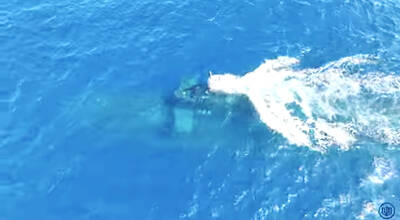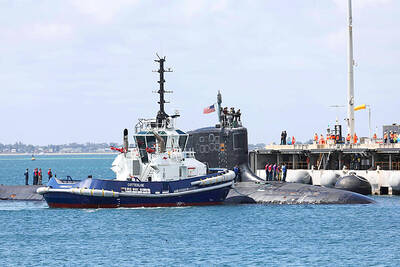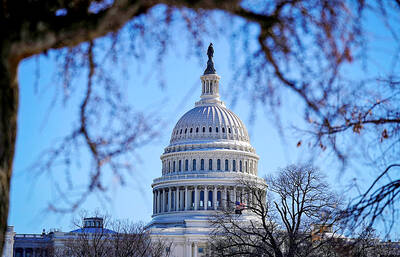Neo-conservatives in the Bush administration -- led by former defense secretary Donald Rumsfeld -- frequently dispatched representatives to Taiwan to encourage President Chen Shui-bian's (
Lawrence Wilkerson, former chief of staff to former secretary of state Colin Powell, was quoted in the Congressional Quarterly article in the issue published on Friday.
Wilkerson said that the actions had the potential to generate a conflict -- possibly nuclear -- between the US and China.
He said that White House officials promoting independence were the same as those who engineered the war on Iraq, including Rumsfeld, former deputy defense secretary Paul Wolfowitz and former UN ambassador John Bolton, as well as former American Institute in Taiwan (AIT) head Therese Shaheen.
Wilkerson alleged that the Department of Defense sent representatives to Taiwan almost every week and told Chen that US-Taiwan relations had now been restored to the level they were at before the 1970s. They allegedly told Chen that "independence is a good thing."
These actions forced then secretary of state Colin Powell to send State Department officials to tell Chen that the White House's "one China" policy remained unchanged, Wilkerson was quoted as saying.
The State Department continued its actions until US President George W. Bush personally asked Rumsfeld to cease encouraging Taiwanese independence and resume military exchanges with China, according to Wilkerson.
Wilkerson was also quoted as saying that Shaheen, a former AIT chairwoman, had claimed that Bush did not mean what he said when he supported the "one China" policy, which upset the Chinese government. She was later relieved of her post.
The report in Congressional Quarterly also quoted former Department of Defense spokesperson Lawrence DiRita as describing Wilkerson's comments as "ridiculous."
"The idea that there was some kind of DoD [defense department] attempt to favor some faction in Taiwan ... is just crazy," DiRita told Congressional Quarterly.

CSBC Corp, Taiwan (台灣國際造船) yesterday released the first video documenting the submerged sea trials of Taiwan’s indigenous defense submarine prototype, the Hai Kun (海鯤), or Narwhal, showing underwater navigation and the launch of countermeasures. The footage shows the vessel’s first dive, steering and control system tests, and the raising and lowering of the periscope and antenna masts. It offered a rare look at the progress in the submarine’s sea acceptance tests. The Hai Kun carried out its first shallow-water diving trial late last month and has since completed four submerged tests, CSBC said. The newly released video compiles images recorded from Jan. 29 to

DETERRENCE EFFORTS: Washington and partners hope demonstrations of force would convince Beijing that military action against Taiwan would carry high costs The US is considering using HMAS Stirling in Western Australia as a forward base to strengthen its naval posture in a potential conflict with China, particularly over Taiwan, the Wall Street Journal reported on Saturday. As part of its Indo-Pacific strategy, Washington plans to deploy up to four nuclear-powered submarines at Stirling starting in 2027, providing a base near potential hot spots such as Taiwan and the South China Sea. The move also aims to enhance military integration with Pacific allies under the Australia-UK-US trilateral security partnership, the report said. Currently, US submarines operate from Guam, but the island could

RESTRAINTS: Should China’s actions pose any threat to Taiwan’s security, economic or social systems, China would be excluded from major financial institutions, the bill says The US House of Representatives on Monday passed the PROTECT Taiwan Act, which states that Washington would exclude China from participating in major global financial organizations if its actions directly threaten Taiwan’s security. The bill, proposed by Republican Representative Frank Lucas, passed with 395 votes in favor and two against. It stipulates that if China’s actions pose any threat to Taiwan’s security, economic or social systems, the US would, “to the maximum extent practicable,” exclude Beijing from international financial institutions, including the G20, the Bank for International Settlements and the Financial Stability Board. The bill makes it clear that China must be prepared

Taiwanese trade negotiators told Washington that Taipei would not relocate 40 percent of its semiconductor production to the US, and that its most advanced technologies would remain in the nation, Vice Premier Cheng Li-chiun (鄭麗君) said on Sunday. “I told the US side very clearly — that’s impossible,” Cheng, who led the negotiation team, said in an interview that aired on Sunday night on Chinese Television System. Cheng was referring to remarks last month by US Secretary of Commerce Howard Lutnick, in which he said his goal was to bring 40 percent of Taiwan’s chip supply chain to the US Taiwan’s almost